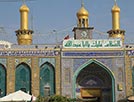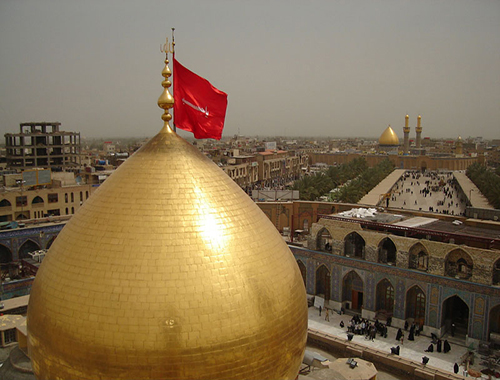Al-Muraja'at
- Details
- Hits: 5277
Al-Muraja'at
Glossary
Athan: the call for prayers; muaththin is one who performs athan.
Athbat: plural of thabat, one who is widely recognized as an authority in his own field.
`Atiyya: gift, present, grant, boon
`Awl: one sought during the time of need, a reliable helper
Bada': starting point, the very beginning of something, the onset
Bara'ah: dissociation or renunciation
Baytul-Mal: Islamic government's state treasury
Diwan: a collection of poems
Faqih: jurist, one who is knowledgeable in Islamic jurisprudence
Fatawa: plural of fatwa, a religious edict or decision
Fiqh: the science of Islamic jurisprudence
Firqa: group, party, sect
Furü`: branches of the faith
Hadith: (singular:) tradition, a statement made by Prophet Muhammad (pbuh); its plural is: ahadith
Hajj: Islamic pilgrimage to Mecca during the prescribed period
Ihram: pilgrimage garb, white unwoven cotten shroud worn by pilgrims
Ijtihad: the degree one reaches in order to be qualified as a mujtahid, one who is capable of deriving religious decisions on his own
Imam: leader of an ummah, a group of people (small or big); he may be the one who leads others in congregational prayers, or a supreme relgious authority, or one of the Twelve Infallible Imams (as)
Isnad: the method whereby one hadith is traced and in the end attributed to a muhaddith, traditionist, one who transmitted it the first time
Jahiliyya: pre-Islamic period of ignorance
Janaba: uncleanness caused by seminal discharge
Jihad: a struggle, an effort exerted, or a war waged in defense of Islam
Jizya: a protection tax paid by non-Muslims living under Muslims' control in exchange for their exemption from the military service
Kafir: infidel, apostate, atheist, one who does not believe in the existence of the Creator
Kalam: the science of logic
Kalima: synonymous to "shahada," it is a Muslim's declaration of faith (that is, to testify that there is no god except Allah, and that Muhammad (pbuh) is the Messenger of Allah), and it is always pronounced in Arabic
Khiraj: the combination of all religious taxes collected at the end of the Islamic lunar year
Khums: one-fifth of one's savings (usually paid by Shi`a Muslims) set aside from annual income
Khutba: lecture, sermon; a speech delivered on a specific occasion
Kufr: apostacy, infidelity, disbelief
Kunyat: usually applied for a parent, it is the way of calling him or her by the name of his or her oldest son (such as saying "father of so-and-so" or "mother of so-and-so"), or it may be applied out of respect, a tradition usually followed in Arab countries, and it is applied as a prefix to one's name.
Maqam: standing place, a place where one usually stands to preach or address the public
Mawla: depending on its usage, it may mean either "master" or "slave," or it may mean one who is most fit for a specific position of honor and prestige. Derived from the adjective awla (one who is best qualified), it means: the person who is best suited to be the religious and temporal leader of all Muslims.
Mu'min: believer, one who has iman, conviction, true belief
Mujtahid: one who acquires the degree of ijtihad and thus becomes capable of deriving religious decisions on his own
Musnad: a compilation of traditions (ahadith) which are consecutively and chronologically traced to their transmitters
Mut`a: temporary marriage
Mutawatir: consecutively reported, traced by a perfect chronological chain of ascertained narrators of hadith
Najasa: uncleanness, impurity
Najwa: a silent supplication
Nuthur: plural of nathr, one's pledge to do something very good to show appreciation for the Almighty's favorable response to his supplication and the attainment of his worldly wish
Qayyim: person in charge of something, one charged with authority
Qibla: direction towards the Ka`ba, Mecca
Sadaqa: (singular:) charity offered voluntarily; its plural is: sadaqat
Sahabah: (singular:) companions of the Holy Prophet Muhammad (pbuh); its plural is: sahabi
Shari`a: Islam's legislative system
Shubha: (singular) doubt, suspicion; its plural is: shubuhat
Shüra: the principle of mutual consultation, Islam's form of democracy
Siqaya: the act of providing water to the thirsty free of charge
Sunan: plural of sunnah: a highly commended act of worship or way whereby a Muslim seeks nearness to Allah
Tabi`i: (singular:) one who accompanied for a good period of time and learned from a sahabi, a companion of the Holy Prophet Muhammad (pbuh); its plural is: tabi`in
Tafsir: (singular:) exegesis or explanation of Qur'anic verses; its plural is: tafasir
Tahara: purification, the act of removing najasa, uncleanness or impurity
Takbir: the act of glorifying Allah by declaring in an audible voice: "Allaho Akbar!" Allah is Great!
Taqiyya: one's way of exerting precaution in order to save his life when it is in jeopardy, Shi`as' way of trying to survive against the presence of sure perils
Taqlid: the concept of following a mujtahid or an authority recognized as the a`alam, the most knowledgeable in Islamics
Tashahhud: the testimony regarding Allah being the Lord and Muhammad (pbuh) being His Servant and Messenger; it is the uttering of "Ashhadu an la ilaha illa-Allah, wa anna Muhammad abdoho wa rasooloh"
Tawatur: consecutive reporting, the tracing of one particular hadith to its respective chronological chain of narrators
Tawhid: the concept of the absolute Unity of God, the belief that God is One and indivisible, One - and Only One - God
Tawwabin: the penitent ones, those who repented their reluctance to go to the rescue of Imam Husain (as) when he was confronted with Yazid's armies and who enlisted under the military command of al-Mukhtar and pursued those who massacred Imam Hussain ibn Ali ibn Abu Talib (as) and killed them
Thiqat: plural of thiqah, a trustworthy authority
`Ulema: plural of `alim, scholar-theologian
Usül: the basics of jurisprudence
Waqf: a piece of property dedicated for the promotion of any particular good cause
Wilayat: supreme authority that combines both temporal and religious authority
Zakat: Literally, it means "purification;" it is a compulsory 2.5% tax on one of three categories of wealth: 1) metal coins (gold, silver, etc.), 2) grain crops (barley, wheat, grain, rice, etc.), and 3) animals raised for food consumption. Zakat is somehow a complicated issue, and for details, readers are advised to consult books dealing with fiqh. Among its types are: zakat al-mal (taxable wealth accumulated during one full year), and zakat al-fitr (a tax to be paid by the head of a household at the commencement of the fast of the month of Ramadan).
And surely Allah knows best...











